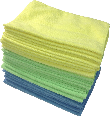Roofs are the most neglected area of any house, and they can become a safe haven for moss and lichen. Although these organic deposits do not usually affect the strength and other physical characteristics of roofs, they certainly create a dull and grim appearance. Stains on shingles are not impossible to clean, but they are a difficult problem to solve.
Stains in shingles are mainly caused by mold, mildew, moss, and lichen buildup. Address the matter immediately to prevent the spread of this fungal growth all over your house.
The gush of water at a high pressure can break all the moss and lichen build up. You have to place a garden hose about 3 feet away from the shingles, so that the water streams down with force. Scrub the shingles gently with a scrub brush to remove stains. A high powered pressure washer can thrust away any kind of grime on your shingles, but you should use it with care since the water pressure may damage weak shingles.
Molds and mildews are the main culprit for generating stains on shingles. These types of fungus on your roof take the form of black or dull gray deposits on the shingles. Sometimes they are found in red and green also. Traditional methods for removing stains from shingles involve the use of toxic chemicals like oxalic acid, chlorine bleach, or trisodium phosphate. They are sprayed with pressure to deep-clean the inaccessible corners of roof and shingles. But these toxic materials can harm animals, plants, or human skin in general.
A common solution for removing stains from shingles is to apply oxygen bleach. Oxygen bleach, which is sold in most malls or on cable T.V., is available in a powdered form and has to be mixed with water to remove stains. This material has the capacity to remove stains using the power of oxygen. It is a safer alternative to traditional shingle cleaning methods as it oxidizes to remove organic stains without hurting your pets or plants.
Because shingles get hot under the sun very quickly, you'll need to choose a cooler day for oxygen bleach application. During the application, you will need to keep the surface of the roof wet for about forty-five minutes; otherwise the solution will evaporate without producing the expected result.
The ratio of the oxygen bleach powder and water depends on the concentration of oxygen bleach in the product. In the case of highly concentrated bleach, you will need less bleach per gallon of water to deep clean the shingles.
The ideal method of applying oxygen bleach is to use a garden sprayer. First of all, you have to locate the darker stains. Spray one layer of oxygen bleach over the darkly stained shingles, then cover the entire roof with a layer of spray. Follow up with a final spray over the darker stains.
Let the oxygen bleach sit for fifteen to twenty minutes and then wash it off with water. For best results, rinse the area with a high-power hose. A standard nozzle should be set to its highest stream setting. Spray from close to the shingles to shake off the stains loosened by the cleaner.
After you treat your roof with oxygen bleach, you should be sure to apply roof protection strips. Protective strips will prevent the return of fungus and moss. Stains may return due to pollution and dust in general. In order to maintain a clean roof, apply oxygen bleach whenever necessary.

The Power of Microfiber! Zwipes Microfiber Cleaning Cloths will become your favorite tool for every cleaning task. This 36-cloth package is perfect for hundreds of uses in the garage, kitchen, bathroom, laundry, and all around the house. Each cloth is tough, streak-free, lint-free, reusable, and washable. Check out Microfiber Cleaning Cloths today!
Most home owners are surprised to learn that the stains they see on their roof are caused by fungus, and do not result ...
Discover MoreOver time, wood shingles can begin to look dirty, stained, or overgrown with moss. With a cleaning solution and other ...
Discover MoreWhether it is after a particularly cold winter, or simply a cold snap, there comes a dirty job that needs to be done if ...
Discover MoreFREE SERVICE: Get tips like this every week in Cleaning Tips from Tips.Net. Enter your address and click "Subscribe."
There are currently no comments for this tip. (Be the first to leave your comment—just use the simple form above!)
FREE SERVICE: Get tips like this every week in Cleaning Tips from Tips.Net. Enter your address and click "Subscribe."
Copyright © 2024 Sharon Parq Associates, Inc.
Comments